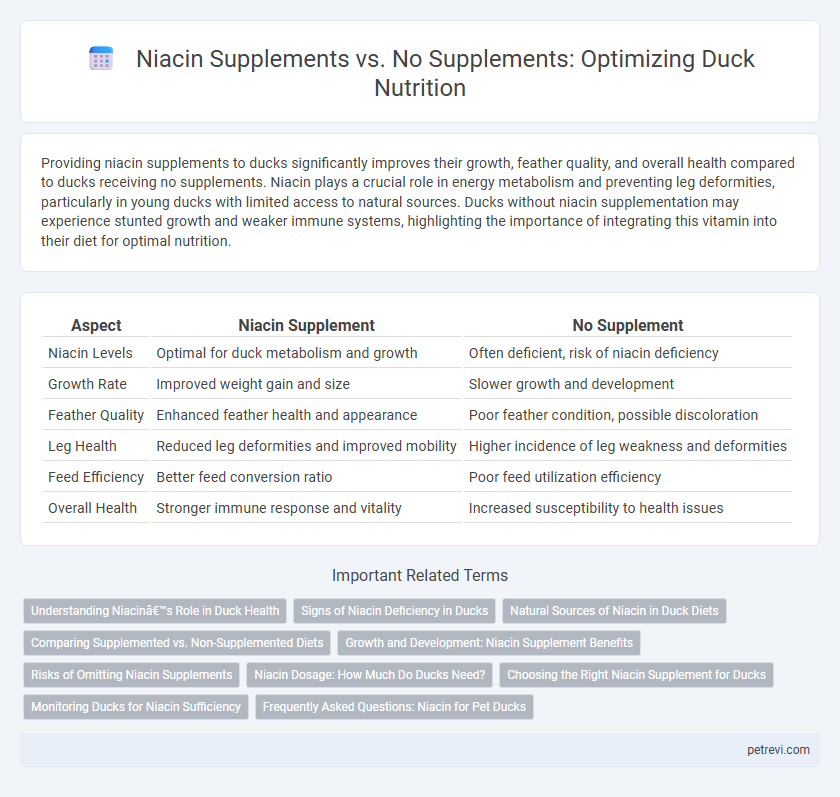Providing niacin supplements to ducks significantly improves their growth, feather quality, and overall health compared to ducks receiving no supplements. Niacin plays a crucial role in energy metabolism and preventing leg deformities, particularly in young ducks with limited access to natural sources. Ducks without niacin supplementation may experience stunted growth and weaker immune systems, highlighting the importance of integrating this vitamin into their diet for optimal nutrition.
Table of Comparison
| Aspect | Niacin Supplement | No Supplement |
|---|---|---|
| Niacin Levels | Optimal for duck metabolism and growth | Often deficient, risk of niacin deficiency |
| Growth Rate | Improved weight gain and size | Slower growth and development |
| Feather Quality | Enhanced feather health and appearance | Poor feather condition, possible discoloration |
| Leg Health | Reduced leg deformities and improved mobility | Higher incidence of leg weakness and deformities |
| Feed Efficiency | Better feed conversion ratio | Poor feed utilization efficiency |
| Overall Health | Stronger immune response and vitality | Increased susceptibility to health issues |
Understanding Niacin’s Role in Duck Health
Niacin plays a crucial role in duck metabolism by supporting energy production and maintaining healthy skin and feathers. Ducks supplemented with niacin show improved growth rates and reduced leg deformities compared to those without supplementation. Ensuring adequate niacin intake prevents deficiency symptoms such as swollen joints and feather abnormalities, promoting overall duck health and productivity.
Signs of Niacin Deficiency in Ducks
Niacin deficiency in ducks often leads to symptoms such as curled toe paralysis, reduced growth rates, and lethargy, severely impacting their overall health and productivity. Supplementing duck diets with niacin significantly reduces these signs by supporting proper metabolism and nervous system function. Without adequate niacin supplementation, ducks are at higher risk of developing these deficiency symptoms, which can compromise their immune response and increase mortality rates.
Natural Sources of Niacin in Duck Diets
Natural sources of niacin in duck diets include grains such as corn and barley, as well as legumes like soybeans, which provide essential B3 vitamins crucial for energy metabolism and overall health. Ducks efficiently absorb niacin from these natural foods, reducing the need for synthetic niacin supplementation in well-balanced diets. Incorporating diverse natural feed ingredients rich in niacin enhances nutrient bioavailability and supports optimal growth and feather development in ducks.
Comparing Supplemented vs. Non-Supplemented Diets
Supplementing a duck's diet with niacin enhances metabolic functions, promotes healthy plumage, and supports energy production, leading to improved growth rates and overall vitality. Non-supplemented diets often result in niacin deficiency symptoms such as leg weakness, poor feather development, and reduced feed efficiency. Studies show that ducks receiving niacin supplements exhibit stronger immune response and better resistance to metabolic disorders compared to those on natural feed alone.
Growth and Development: Niacin Supplement Benefits
Niacin supplementation in duck diets significantly enhances growth rates and overall development by improving energy metabolism and promoting efficient nutrient utilization. Ducks receiving niacin supplements show increased weight gain, better feather quality, and stronger skeletal development compared to those without supplementation. Optimal niacin levels reduce the risk of metabolic disorders, ensuring healthier and more robust growth performance in ducks.
Risks of Omitting Niacin Supplements
Omitting niacin supplements in duck nutrition can lead to severe deficiency symptoms such as poor growth, dermatitis, and neurological disorders. Niacin is essential for energy metabolism and cellular function in ducks, making supplementation critical in diets low in natural niacin sources. Prolonged absence of niacin supplementation increases the risk of reduced immune function and higher mortality rates in duck populations.
Niacin Dosage: How Much Do Ducks Need?
Ducks require a niacin dosage of approximately 40 mg per kilogram of feed to support optimal growth, feather development, and metabolic functions. Insufficient niacin supplementation can lead to signs of deficiency such as curled toes, poor growth, and lethargy, whereas adequate niacin intake ensures strong immune response and efficient nutrient absorption. Providing a controlled niacin supplement in duck diets improves overall health and productivity compared to no supplementation.
Choosing the Right Niacin Supplement for Ducks
Selecting the appropriate niacin supplement for ducks is crucial to prevent deficiency-related issues like leg deformities and slowed growth. Niacin-rich feed additives such as brewer's yeast or synthetic niacin provide bioavailable forms that enhance metabolic function and support healthy feather development. Ensuring the right dosage aligned with species-specific nutritional requirements optimizes health outcomes compared to no supplementation, which risks impaired development and reduced productivity.
Monitoring Ducks for Niacin Sufficiency
Monitoring ducks for niacin sufficiency is crucial to prevent deficiency symptoms such as curled toe paralysis and poor growth. Niacin supplements support metabolic functions, improving feed conversion rates and overall health in ducks. Regular assessment of niacin levels through dietary analysis and observation of physical indicators ensures optimal nutritional balance and enhances productivity.
Frequently Asked Questions: Niacin for Pet Ducks
Niacin is essential for pet ducks to support their metabolism, growth, and prevention of curled toe paralysis, a common deficiency symptom. Supplementing niacin in duck diets is recommended when feeding predominantly corn-based feeds, which are low in this vitamin. Regularly monitored niacin intake improves overall duck health and vitality compared to no supplementation.
Niacin supplement vs No supplement for Duck nutrition Infographic

 petrevi.com
petrevi.com